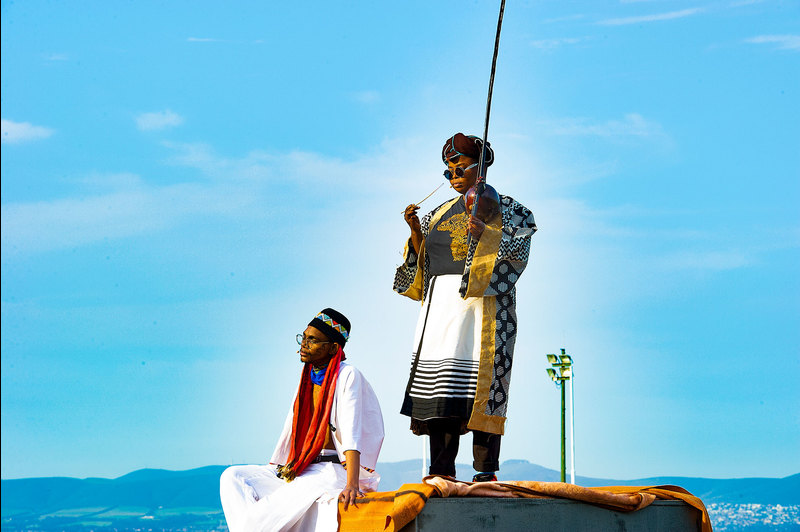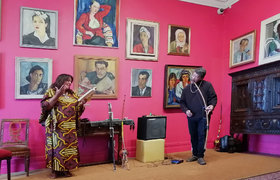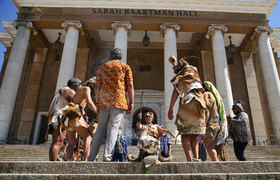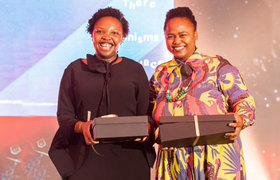A fire in our (he)art
22 September 2022 | Story Nicole Forrest. Photos Lerato Maduna. Read time 7 min.
The University of Cape Town’s (UCT) Works of Art Collection (WOAC) in collaboration with its Institute for Creative Arts (ICA) launched a collection of four live works of art on upper campus on 15 September. The event turned the Sarah Baartman precinct into a gallery of performative art, reading, discussion and film.
At the foot of the steps in front of the Sarah Baartman Hall, against the backdrop of a sprawling city, stands a figure draped in black robes that billow in the afternoon breeze. The contrast against the hazy twilight view and the power of the words she speaks rendering her statuesque.
“I stand here with you today with grief in my heart, but with love as a faithful companion. I can sense beneath my feet a rumbling of things falling. Calling for new things to rise. I listen to the ground to feel the rhythms of its demands and I’m happy to learn that my body remembers the song of this land. A charge of history telling us to be brave. Moving us to dream the greatest dream yet.”
With these words, Dr Uhuru Phalafala opened Umsebenzi, the evening’s programme of presentation, conversation, reading and music that preceded the premier of The Fire This Time, a collection of short films focused on artworks that were installed around the Sarah Baartman precinct in early 2022.
“The intention of inserting vernacular languages and intellectual works at a space such as UCT is not to the exclusion of English, but to create a space of linguistic equality.”
According to Thiyane Duda, a researcher at the UCT Land and Accountability Research Centre and co-facilitator of the event, the aim was to reimagine change at UCT and South Africa at large.
Delivered predominantly in isiXhosa and co-curated by the director of Greatmore Studios and the founder of makwande.republic, Ukhona Ntsali Mlandu, Umsebenzi entailed musical performances by Sky Dladla and Odwa Bongo, as well as a reading by Duda from Witness K Tamsanqa’s 1978 novel Ithemba Liyaphilisa.
“Umsebenzi is acknowledging the works or contributions (iimisebenzi) of vernacular intellectuals, as well as speaking to the spiritual. The intention of inserting vernacular languages and intellectual works at a space such as UCT is not to the exclusion of English, but to create a space of linguistic equality,” he said.
These performances complemented the works featured in The Fire This Time, which focus on and speak to forces – or fires – that exist in society and have the potential to be both destructive and restorative; distancing and unifying.
A place of material and metaphorical fires
The Sarah Baartman plaza was chosen specifically for the significant place it occupies both in UCT’s and South Africa’s history as a site for political debate, demonstration and change.
“The Sarah Baartman precinct is potentially the heart and soul of the UCT campus. The precinct roughly constitutes the area from the steps of Sarah Baartman Hall across [the plaza] and the residency’s parking lot, to the World War memorial and across Madiba Circle to the plinth where Rhodes fell,” noted WOAC chair, Associate Professor Nomusa Makhubu.
“The often-hidden histories and events that have taken place here have had a far-reaching impact on the university and how the site is experienced today,” she said.
Among the many momentous campaigns that have taken place here are ‘The Mafeje Affair’ protest, where students demonstrated against the discriminatory recission of Archie Mafeje’s appointment at UCT; the protests leading to the momentous removal of the Cecil John Rhodes statue; and the 2016 Shackville protests.
The choice is particularly poignant given the recent devastation that befell upper campus. In April 2021, fires ravaged buildings on the plaza, including the section of the Jagger Library in which the African Studies collection was housed.
“Conceived by the writer-researcher and curator, Pamela Dlungwana, the title evokes the many fires – both material and metaphorical – that continue to shape the Sarah Baartman precinct and the university,” explained Duda.
“Drawing from James Baldwin’s 1963 book The Fire Next Time, which was published at the height of the civil rights movement [in the United States] and illuminates the tragedies of racial injustice, The Fire This Time reflects on sparks in UCT’s ongoing aspiration for transformation.
“Taking its cue from the message of the book, The Fire This Time is a search for an emancipatory, decommodified, people-centred approach to reshaping an equitable, aware, justice-led and enlivened public campus,” he added.
Artistic interventions
Following the reading from Ithemba Liyaphilisa, a panel discussion focused on the trajectory of colonised education, from its presentation in Tamsanqa’s novel to the Rhodes Must Fall and Fees Must Fall movements, as well as the subsequent narrative around the decolonisation of education.
Moderator, Dr Xolisa Guzula, brought out interesting perspectives and nuances in the conversation through her approach of using myth as a contemporary response to the post-apartheid era and viewing the traumas of colonial history from a place of detachment.
After the discussion, the plaza was lit up by the screening of The Fire This Time. The short film showcased artistic interventions and exhibits that took place at various sites across the Sarah Baartman precinct and beyond.
“The works [from artists Qondiswa James, Grant Jurius, Lukhanyiso Skosana and Lesiba Mabitsela] were commissioned in 2021 to attend to the complex (hi)stories that texture the Sarah Baartman precinct, a key site of protest for decades. They are the first to establish a base for new live artworks in the UCT collection,” said Duda.
The audience was treated to a variety of interesting, moving and sometimes unsettling performances. James’ pilgrimage and binding; Jurius’ exploration of fire through his mural and sonic installation; Skosana’s tribute to the womxn, femme, black, queer bodies throughout our South African history; and Mabitsela and Lorin Sookool’s consideration of generational trauma.
Curating UCT’s heritage
With the aim of building a collection of art in line with the university’s mission and vision, the WOAC committee curates artworks that serve as an inspirational and transformative intellectual repository for cultural, educational, scientific and artistic research scholarship.
Through its engaged curation efforts, the collection seeks to ensure that works are safeguarded and contribute to an inclusive expression heritage for the university. Working with the ICA, which focuses on fostering innovative practice and research in the creative and performing arts with a particular focus on black practitioners and South Africans, to produce The Fire This Time, WOAC has created a foundation for the live artworks in UCT’s permanent collection.
For information about the WOAC’s upcoming events and exhibitions visit the collection’s website.
 This work is licensed under a Creative Commons Attribution-NoDerivatives 4.0 International License.
This work is licensed under a Creative Commons Attribution-NoDerivatives 4.0 International License.
Please view the republishing articles page for more information.
























